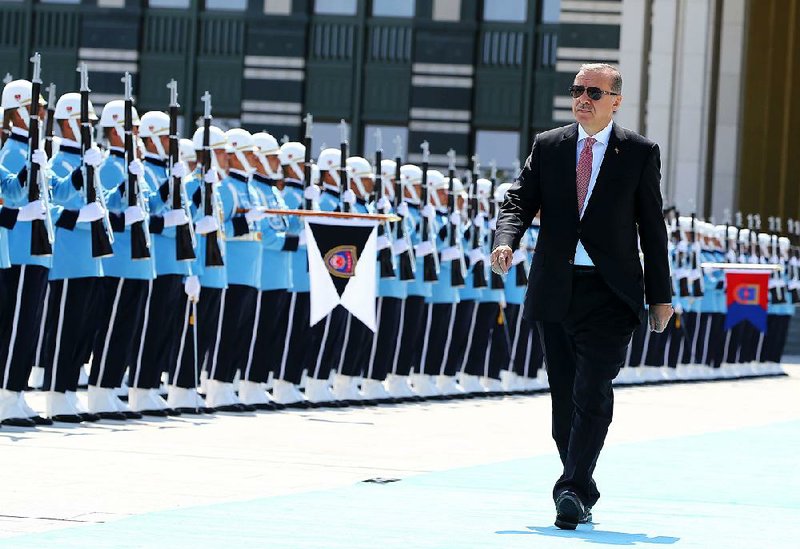ANKARA, Turkey -- U.S. Secretary of State John Kerry is expected to arrive in Turkey later this month, Turkey's foreign minister said Friday, amid strained relations with Washington over the possible extradition of a Muslim cleric accused of being behind an attempted military coup last month.
The Turkish government has expressed growing annoyance with what it regards as a lack of solidarity from international allies after the failed coup, as well as increased frustration over perceived foot-dragging by the United States over a Turkish demand that U.S.-based Muslim cleric Fethullah Gulen be returned to Turkey to face trial.
Turkey accuses Gulen, a former ally of President Recep Tayyip Erdogan who lives in self-imposed exile in Pennsylvania, of masterminding the July 15 coup attempt by renegade officers in Turkey's military. It has designated his movement, which runs charities, schools and businesses across the world, as a terrorist organization and has launched a crackdown on suspected members.
Gulen has denied involvement or prior knowledge of the violent coup attempt that left more than 270 people dead. Washington, for its part, has asked for evidence of the cleric's involvement and has said the extradition process must be allowed to take its course.
Turkish Foreign Minister Mevlut Cavusoglu said Kerry is to arrive in Turkey on Aug. 24, the state-run Anadolu Agency reported. He also spoke of the possibility of a separate visit by U.S. Vice President Joe Biden.
In New York, Taha Ozhan, chairman of the Turkish parliament's Foreign Affairs Commission who is leading a delegation to brief U.S. officials on the failed coup, said "Gulen orchestrated the coup" and continued to pose threat to Turkey.
Ozhan said "many documents have been sent" and "we are doing our homework in Turkey" where "prosecutors are forming a case." He added that the FBI should be monitoring Gulen and he should be detained.
An initial batch of documents submitted by Turkey "did not, we believe, constitute a formal extradition request," U.S. State Department spokesman Mark Toner told reporters Thursday. "But we subsequently received more documents. We're looking through them."
Lawyers for Gulen said the extradition demand "is political in nature" and not backed by evidence.
"Evidence matters and due process matters," Reid Weingarten, one of the attorneys, told reporters in Washington on Friday. "The bluster, the conspiracy theories and the threats of Mr. Erdogan are not strong enough to overwhelm the American legal system. And for that reason, we believe that Mr. Gulen should not and will not be extradited."
Weingarten suggested that the only evidence the Turkish government may have against Gulen is testimony from his sympathizers in Turkey, possibly obtained through torture.
"We haven't seen any evidence, direct or indirect, that would be persuasive to a fact finder that there is a scintilla of evidence -- electronic or otherwise -- implicating Mr. Gulen," Weingarten said. "And these tortured confessions that they are expecting, that wouldn't work in a U.S. court either," Weingarten said.
Weingarten, a partner in Steptoe & Johnson LLP, described the 75-year-old Gulen as an "elderly, frail religious leader" and a "moderate Muslim, anti-terror Islamic scholar" who won't ultimately be sent back to Turkey.
Since the coup attempt, nearly 70,000 people suspected of links to Gulen have been suspended or dismissed from the military, civil service and judiciary, and from the education and health care sectors. About 18,000 people have been detained or arrested, mostly from the military, on suspicion of being involved in the failed coup.
European officials and rights groups have expressed concern over the crackdown while the human-rights group Amnesty International has reported cases of mistreatment of detainees. Turkey has rejected the accusation and said allegations of mistreatment would be investigated.
On Friday, Kazakh President Nursultan Nazarbayev became the first foreign head of state to visit since the failed coup and declared that his country stood in solidarity with Turkey.
Turkey is also pressing its allies to crack down on Gulen-linked schools and charities and has asked Kazakhstan to shut down schools that it says are associated with the movement.
Erdogan announced after talks with Nazarbayev that the two agreed that education authorities from both countries should carry out a joint review of 33 schools in the Central Asian nation that Turkey suspects are linked to Gulen.
The crackdown has also expanded to journalists and former employees of Gulen-linked media. On Friday, Anadolu said 12 journalists who used to work for the Zaman newspaper were formally arrested pending trial, including columnist Mumtazer Turkone. Six other journalists were jailed pending trial last week.
Separately, Germany's Sueddeutsche Zeitung reported that a German woman had been arrested in Turkey on suspicion of belonging to the Gulen movement. It didn't specify when or where she was arrested.
Germany's Foreign Ministry confirmed the report, without giving further details.
Information for this article was contributed by Suzan Fraser, Edith Lederer, Maria Danilova and Geir Moulson of The Associated Press; and by Chris Strohm and Bradley Saacks of Bloomberg News.
A Section on 08/06/2016
